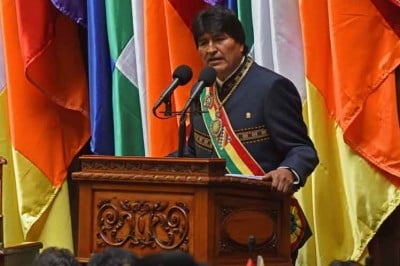Bolivia: President Evo Morales Resigns Amid Right-Wing Coup
His resignation came after senior army heads asked them to resign amid right-wing violence and coup attempt for weeks since the Oct. 20 elections.

Bolivian President Evo Morales was forced to resign Sunday after senior army and police chiefs called on him to do so following weeks of right-wing unrest and violence against his Oct. 20 elections victory, in what his government has called a coup by opposition forces in the country.
“I decided to resign from my position so that Carlos Mesa and Luis Camacho stop abusing and harming thousands of brothers … I have the obligation to seek peace and it hurts a lot that we face Bolivians, for this reason, so I will send my letter of resignation to the Plurinational Assembly of Bolivia,” the former president of Bolivia said in a press release.
Bolivian Vice President Alvaro Garcia Linera also said that he was resigning from his position. The two leaders said that they would be handing their resignation letters to the country’s National Assembly.
Since both President and Vice Presiden resigned, the president of the Senate, a position held by Adriana Salvatierra of the MAS party was supposed to assume the post but she later issued her resignation as well as the president of the Chamber of Deputies.
Currently, the line of succession is broken in Bolivia.
Morales and Garcia Linera will stay in Chimore in the central Department of Cochabamba to work with the people.
“We will come back and we will be millions as Tupac Amaru II said,” Morales declared.
.@evoespueblo: The struggle continues. This is not the end (…) If the IMF policies come back to Bolivia, the worse would happened to Bolivia. pic.twitter.com/O5Ta64OaS3
— teleSUR English (@telesurenglish) November 10, 2019
The resignation comes after Morales proposed a dialogue process with the opposition parties but was rejected and even accepted the Organization of American States’ (OAS) call for new elections.
However, due to strong violent onslaughts against militants and leaders of the Movement To Socialism (MAS), intimidation of journalists, burning of residences and betrayal of political allies and members of the National Police, Morales and his Vice President decided to leave the government in order to prevent more violence.
In the interview with teleSUR’s correspondent in Bolivia Freddy Morales, the former president said the decision to call new elections was to preserve the peace in Bolivia “so that we do not confront the Bolivian family,” while calling on the opposition protesters to end the strikes and remove roadblocks in order to not harm the economy of the country.
*
Note to readers: please click the share buttons above or below. Forward this article to your email lists. Crosspost on your blog site, internet forums. etc.

